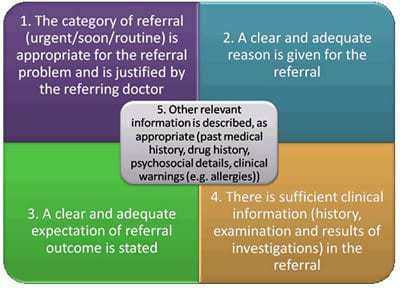REFERRALS
Why is it important to review my referrals and referral letters?
Essentially to ensure you are conveying the right amount of information in the appropriate context when communicating with colleagues. Your colleagues cannot make the right decisions without the necessary information. If you’re the one who is referring, the onus is on you to put the specialist in the picture. The diagram on the right lays out the essential ingredients of a good referral letter.
- When you decide to refer – your reasons for doing so come under the professional comptency “Making Diagnosis & Decisions”.
- The content of your referral letter relates to the professional competency “Communication Skills”
Is referrals an official part of MRCGP assessments?
No, there is not specific MRCGP assessment that focuses on referrals alone. But we think it’s a good thing to do at some point in your training period. Hence making these resources available to you and your trainer – to make it easier and educationally enjoyable!
How do you suggest we look at my referral letters?
There’s a referral assessment tools folder in the downloads section of this page. There, you will find assessment tools you can use to help figure out how good your letters are and how you can make them better.
- One way to do it is to look at a minimum of 3 random letters during your GP post with your trainer.
- Alternatively, why not suggest holding weekly practice referrals meeting – so that other docs learn too and you can learn from them. For this to work though, it is essential that members read out their letter word for word and not to expand on the case before the letter is read out in its entirety. That helps to decide whether there is enough information placed in appropriate context. Many practices these days hold referral meetings. If yours doesn’t, why not suggest it? Take the lead.


